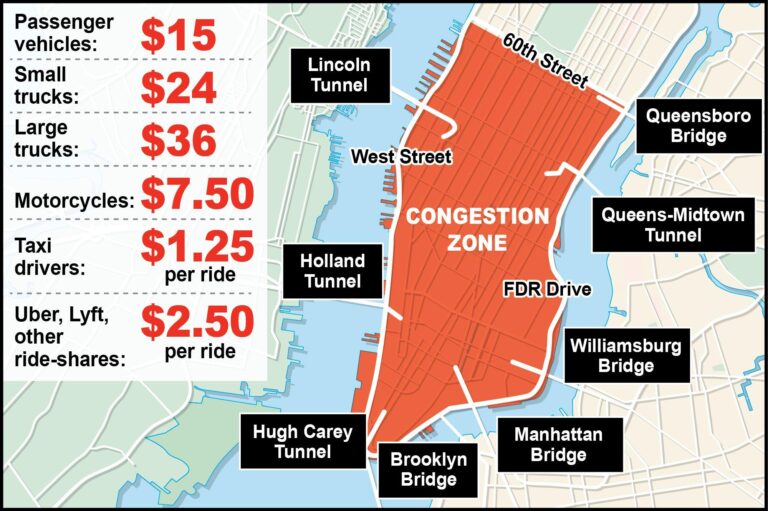Federal Court Upholds New York City’s Congestion Pricing Program, Blocking Trump Administration’s Attempt to End It
A recent federal court ruling has prevented former President Donald Trump’s administration from terminating New York City’s congestion pricing initiative, a pivotal strategy designed to alleviate traffic jams and reduce pollution in the city’s busiest districts. This judicial decision highlights the ongoing tension between federal administrative actions and local urban transportation policies, emphasizing the courts’ critical role in ensuring that policy changes adhere to legal and procedural standards. The ruling represents a major milestone in the city’s efforts to manage traffic congestion in one of the most densely populated urban centers in the United States.
Federal Court Rejects Trump Administration’s Effort to Cancel NYC Congestion Pricing
The court’s judgment serves as a strong legal rebuke to the Trump administration’s abrupt move to dismantle New York City’s congestion pricing program, which charges drivers entering high-traffic zones during peak hours to discourage car use and fund public transit improvements. The judge pointed to procedural flaws and insufficient justification for the administration’s decision, underscoring the necessity for clear, evidence-based policymaking in urban transportation and environmental regulation.
Highlights from the ruling include:
- Continuation of the congestion pricing system to manage traffic flow effectively
- Requirement for federal authorities to engage in ongoing dialog with state and city officials before proposing any modifications
- Recognition of the program’s critical role in financing mass transit upgrades and supporting climate change mitigation efforts
| Area | Effect of Court Decision |
|---|---|
| Traffic Management | Projected reduction in congestion as intended |
| Funding for Public Transit | Secured ongoing financial support |
| Environmental Impact | Preserved emission reduction benefits |
Legal Foundations Supporting the Court’s Verdict on NYC’s Traffic Control Program
The court’s decision is grounded in a detailed interpretation of federal laws governing administrative procedures and environmental regulations related to urban traffic management. The judge affirmed the authority granted to New York’s Department of Transportation to implement congestion pricing as a legitimate tool to reduce traffic congestion,enhance air quality,and promote sustainable transportation alternatives. The ruling confirmed that the program complies with federal environmental mandates, including the Clean Air Act, thereby aligning state initiatives with national environmental objectives.
Key legal principles influencing the ruling included:
- Federalism and State Autonomy: Affirmation of the state’s right to regulate urban traffic provided federal environmental standards are upheld.
- Compliance with the Administrative Procedure Act: Validation that New York’s congestion pricing underwent proper public consultation and impact assessments.
- Environmental Impact Analysis: Consideration of the negative consequences that prematurely ending the program would have on pollution levels and federal clean air goals.
| Legal Element | Influence on Decision |
|---|---|
| State Regulatory Power | Confirmed program’s legality under state law |
| Federal Environmental Compliance | Verified alignment with Clean Air Act requirements |
| Administrative Process | Ensured procedural fairness and clarity |
How Congestion Pricing Transforms Urban Mobility and Environmental Outcomes
New York City’s congestion pricing initiative has catalyzed a notable transformation in travel behavior, aiming to reduce the number of private vehicles in congested areas and encourage greater use of public transit. Recent statistics reveal a measurable drop in car traffic within the charged zones, resulting in smoother commutes and shorter travel times for bus and subway riders.This shift has prompted both residents and businesses to rethink their transportation habits, favoring more sustainable and efficient options.
Along with easing traffic, the program delivers significant environmental benefits that support the city’s climate action goals. These include:
- Lower greenhouse gas emissions: Reduced vehicle idling and improved traffic flow cut carbon dioxide output.
- Enhanced air quality: Decreased levels of harmful pollutants like nitrogen oxides and particulate matter improve public health.
- Increased investment in transit infrastructure: Revenue generated funds expansions and modernization of public transportation networks.
| Metric | Pre-Implementation | Post-Implementation |
|---|---|---|
| Average Vehicle Delay (minutes) | 20 | 12 |
| Daily CO2 Emissions (metric tons) | 8,900 | 6,500 |
| Public Transit Usage (millions of riders) | 5.4 | 6.7 |
Strategic Recommendations for Advancing Sustainable Traffic Solutions in NYC
To maximize the benefits of congestion pricing and foster sustainable urban mobility, policymakers should focus on integrating multiple transportation modes. Expanding and enhancing public transit infrastructure—such as dedicated bus lanes and subway system upgrades—will provide commuters with dependable alternatives to driving. Additionally,deploying smart traffic management systems can further optimize vehicle flow,reduce emissions,and encourage travel during off-peak hours through dynamic pricing strategies.
Ensuring equitable access remains paramount to prevent undue burdens on economically disadvantaged and marginalized communities. Recommended measures include:
- Subsidized transit fares targeted at low-income riders
- Development of safe pedestrian and bicycle pathways to promote active transportation
- Establishment of community engagement platforms to incorporate local feedback into policy design
- Stricter enforcement against illegal parking and traffic violations to maintain smooth street-level traffic
| Focus Area | Proposed Action | Anticipated Result |
|---|---|---|
| Public Transit | Increase dedicated bus lanes | Reduced delays and higher ridership |
| Traffic Technology | Implement adaptive traffic signals | Improved traffic flow and reduced congestion |
| Equity | Offer fare subsidies for low-income riders | Greater transit accessibility and fairness |
Conclusion: The Future of NYC’s Congestion Pricing Amid Legal and Policy Challenges
The recent court ruling represents a pivotal moment in the ongoing legal contest over New York City’s congestion pricing program, delivering a setback to efforts aimed at halting the initiative. This decision highlights the judiciary’s crucial function in balancing political pressures with regulatory frameworks that govern urban transportation. As the program moves forward, stakeholders—including city officials, commuters, and environmental advocates—will be closely monitoring its impact on reducing traffic congestion and advancing environmental sustainability in one of America’s busiest metropolitan regions.




